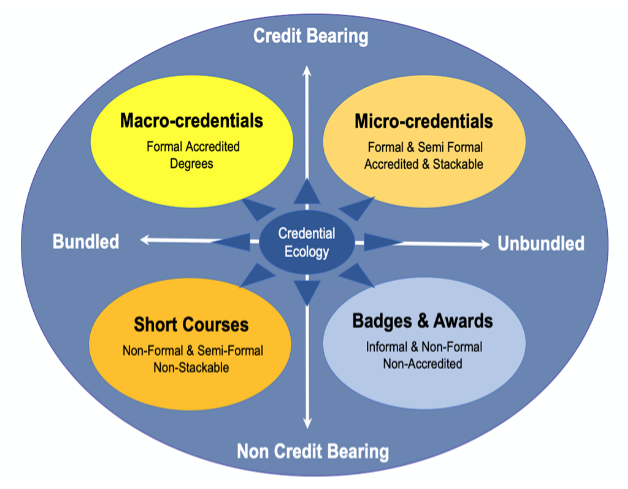Interest in using micro-credentials to demonstrate professional development and expertise has remained steady, but is predicted to increase due to a combination of factors, such as sustainable recovery from Covid-19, the recent announcement of the Lifelong Loan Entitlement, and growing pressure to improve opportunities for inclusion in education.
In the spirit of this last aspiration, and aiming to bring more disadvantaged learners into education, North West Regional College (NWRC) based in Northern Ireland approached us to collaborate on a Pathfinder project.
NWRC staff wanted to explore how they could implement hybrid micro-credentials aimed at trying to address unemployment issues in Derry, Limavady and Strabane where they have campuses. In this region, the economic inactivity rate is higher than the Northern Ireland and UK average, which means that a substantial number of the working-age population in the area are not participating in the labour market. This has led to social and economic issues, such as poverty, social exclusion and a lack of economic growth in the area.
What is a micro-credential?
The definition and usage of the term micro-credential is not consistent. Oliver (2022) completed a UNESCO report on micro-credentials, including a common definition, stating that a micro-credential:
- is a record of focused learning achievement verifying what the learner knows, understands, or can do;
- includes assessment based on clearly defined standards and is awarded by a trusted provider;
- has stand-alone value and may also contribute to or complement other micro-credentials or macro-credentials, including through recognition of prior learning; and
- meets the standards required by relevant quality assurance.
Micro-credentials offer a complementary alternative to formal qualifications, such as degrees, which can take years of study and investment. They can make the educational offer of higher and further education institutions more flexible and accessible. Micro-credentials require fewer resources and less time, so learners can obtain a certification more quickly.

Image showing a taxonomy of micro-credentials from Brown et al (2020)
Where could micro-credentials make a difference?
Micro-credentials generally appeal to those who want to prove their knowledge and skills in a certain area, often related to their job, or employment they are seeking. However, colleagues at NWRC postulated that micro-credentials could provide an attractive route into education for previously dis-enfranchised learners. The high economic inactivity rate in their local region is in part caused by a mismatch between the skills of the workforce and the needs of local employers. Addressing these issues is crucial to improving the employment situation and supporting the economic and social development of the area.
As such, we are exploring how micro-credentials may have a role to play in supporting skills development offering an informal supported route into FE. It should be possible to complete a micro-credential course around existing commitments, and without changing employment status.
How do micro-credentials relate to other courses?
Equivalence mapping is the process of connecting micro-credentialled courses with existing qualification frameworks. Clearly relating micro-credentials to established forms of certification may allow learners and potential employers to understand their value more easily. Establishing equivalence may allow micro-credentials to be stacked or added together. The mapping also provides assurance about what level each course corresponds to within recognised learning pathways like undergraduate or postgraduate studies.
This type of equivalence technique could also help bridge gaps between academic institutions. Students from diverse backgrounds and educational experiences could recognise and demonstrate how their micro-credentials relate to other forms of certification and pre-requisites for courses. This could, in turn, help disadvantaged learners gain access to longer term education and opportunities.
Staff at NWRC made a key observation about the importance of basing each micro-credential within a quality assured pedagogical framework if they are to realise the aspiration of increasing inclusion.
How else are micro-credentials being used in education?
As indicated in a recent case study from Abertay University micro-credentials can be adopted in formal educational settings, as modules included in accredited programmes. In these cases, the micro-credential is usually aimed at improving the employability and transferable skills of undergraduates. However, McGreal and Olcott Jnr (2022) assert that many competencies and skill-based credentials will not line up with the typical requirements for formal credentials. Employers wanting ‘just-in-time’ certified skill sets for specific needs won’t necessarily care about formal credentials.
Over the border from NWRC, MicroCreds led by the Irish Universities Association is a national project, delivered in partnership with seven universities. Taking a joined-up approach to micro-credential development and use, its vision is to be the first European country to establish a national framework for accredited micro-credentials. This is aimed at boosting a transformation in lifelong and life-wide learning. Strands of the work cover employability and serve learners who want to stack credentials into larger academic awards.
The Open University offers micro-credentials through their OpenLearn Create program, allowing learners to earn digital badges for completing short courses. The badges can be stacked to show a comprehensive understanding of a subject and are recognised by employers. They also offer micro-credentials through the FutureLearn platform, providing a focused and targeted learning experience. The goal is to offer flexible and accessible learning opportunities to students and to provide achievement evidence to employers.
What next?
Our preliminary research has shown higher activity for delivery of accredited micro-credentials in higher education, but less in further education. We plan to produce some advice about considerations for implementing micro-credentials.
We will work with NWRC and their partners to validate the advice produced. However, we would like to talk to other further education providers who could contribute a case study or discuss their plans. Please contact innovation@jis.ac.uk.

